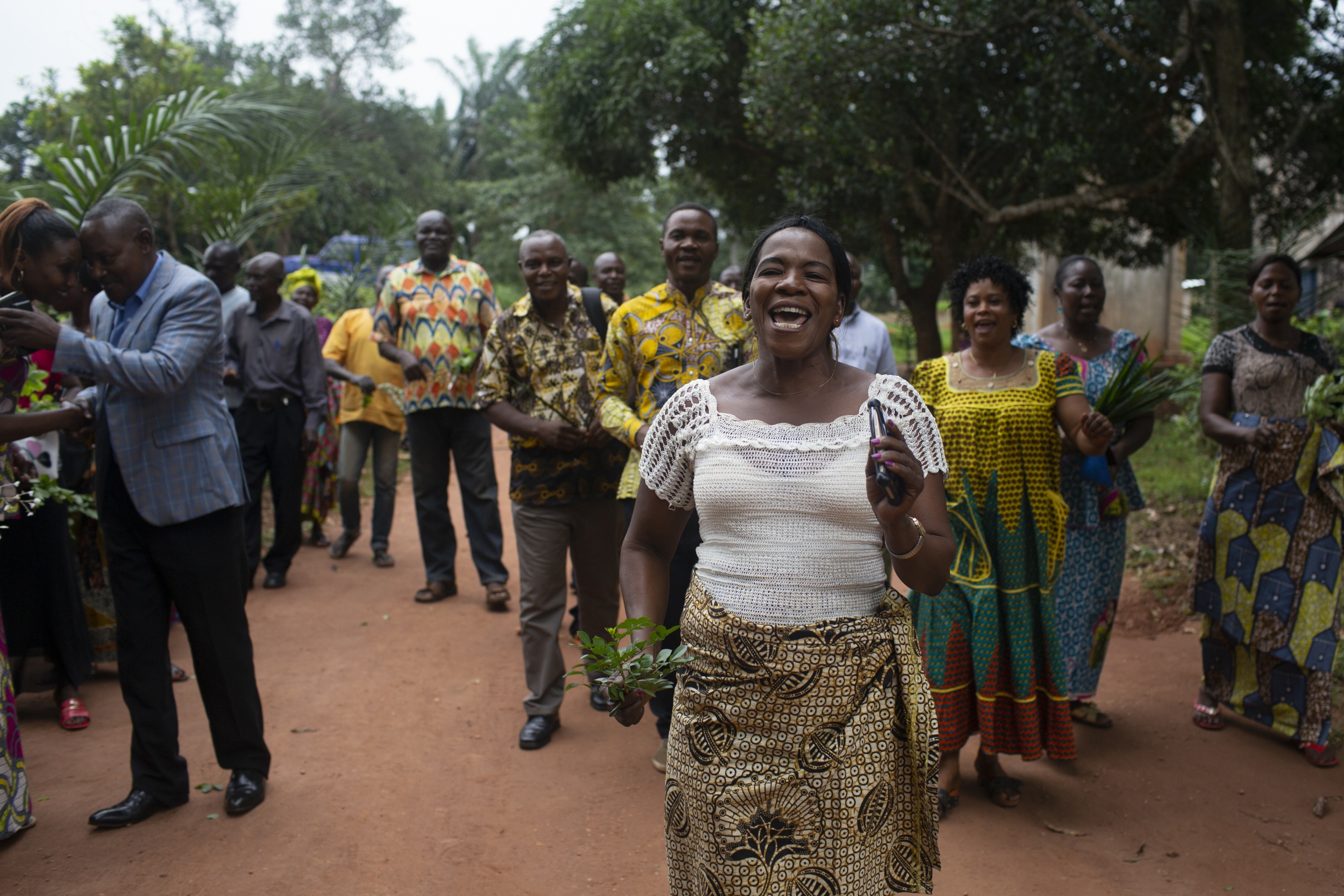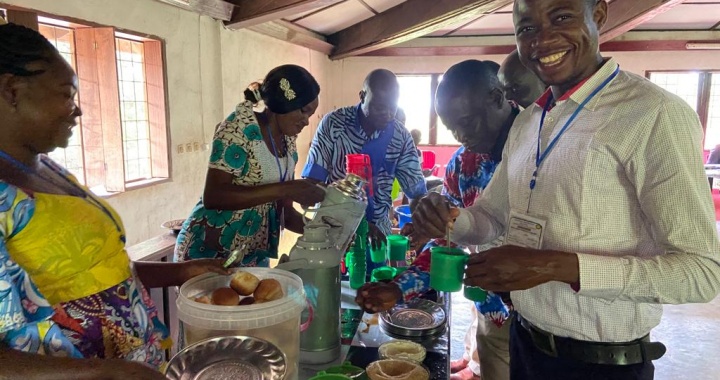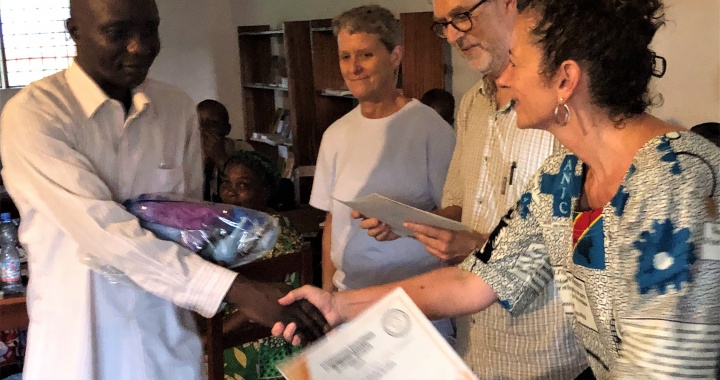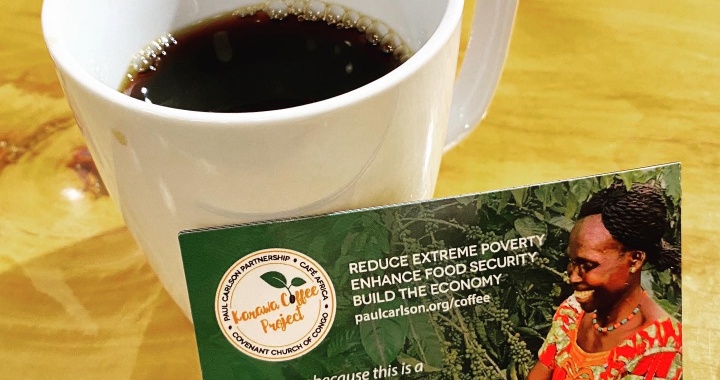After years of conflict and harvest failure, producers in DR Congo are reclaiming a prosperous crop and building the church.
by Erin Chan Ding, photos by Kristen Norman and Becky Dangel | January 16, 2020
KARAWA, Democratic Republic of the Congo—Three degrees north of the equator, the land undulates. In this northwest region of the Democratic Republic of the Congo, trees emerge with each roll of expanse, their tops the shape of broccoli florets.
African sword grass rises, too, striated by roads of reddish orange soil that sticks to shoes and clothing, as if the land has determined it will wedge its way into all who traverse it.
Among the vegetation here, something both new and familiar has started growing in more than 1,400 small plots. Sapling plants, 812,000 of them, stick straight up, as if at military attention. The plant is, in fact, called that at one point in its development—le petit soldat, or the little soldier—in French, the official language of DR Congo.
Within two years, these modest-looking plants, which rise now to about knee height, will shoot over everyone’s heads, yielding ketchup-colored cherries that will be processed and dried as beans before being sold in the international market as Karawa coffee.
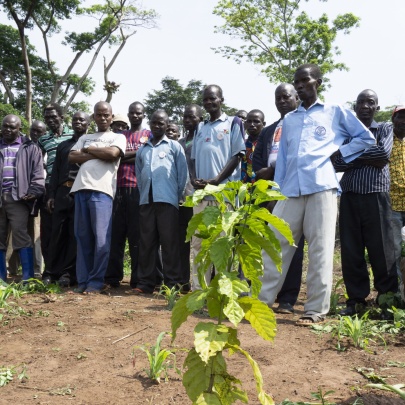
The story of coffee has both history and hope here. Thousands of people in the villages remember how coffee plants once thrived but were stifled by an unforeseen drop in coffee prices, a devastating coffee wilt disease, and then the terror of multiple civil wars. But now, due in large part to a partnership between the Communauté Evangélique de l’Ubangi Mongala (Covenant Church of Congo), the nonprofit Café Africa, and the Evangelical Covenant Church’s Paul Carlson Partnership (PCP), coffee, in the form of the Karawa Coffee Project, has re-emerged. Violent conflict in the region has dissipated for more than a decade, and Café Africa has introduced a coffee plant originating in Uganda that is resistant to coffee wilt disease. Now, the funding of PCP, the technical expertise of Café Africa, and the network of the Covenant Church of Congo (or CEUM) have converged to make it possible for thousands of Congolese to plant, cultivate, and harvest coffee, reaping not just a high-value crop but the hope of providing well for their families.
The model of coordinating coffee production among more than 1,400 small farms represents an economic reframing. Decades ago, Belgian and British companies in the Karawa region drove coffee production, and the Congolese who worked on those farms—once referred to as “coffee plantations”—received a wage for their labor. According to Kambale Kisumba Kamungele, executive director of Café Africa in the DR Congo, those who did own small plots of land to produce their own coffee were largely beholden to the companies to facilitate production.
On a mid-August day last summer, one small producer, Paul Ndadua Telewa, sits near his field of about 690 coffee plants, hindered from tending them by a downpour that lasts two hours. When it rains in torrents like this, there’s nothing to be done other than to sit under a shelter. The dirt roads become impassable, inhibiting long walks to nearby markets to sell nuts and plantains and manioc greens. Yet Telewa seems unbothered—the rain is nourishing his plants. He rests on a bamboo bench inside a church in the village of Bobakutu as water pounds on the corrugated metal roofing. He reflects on a rough season his family experienced several months earlier, and his eyes grow teary.
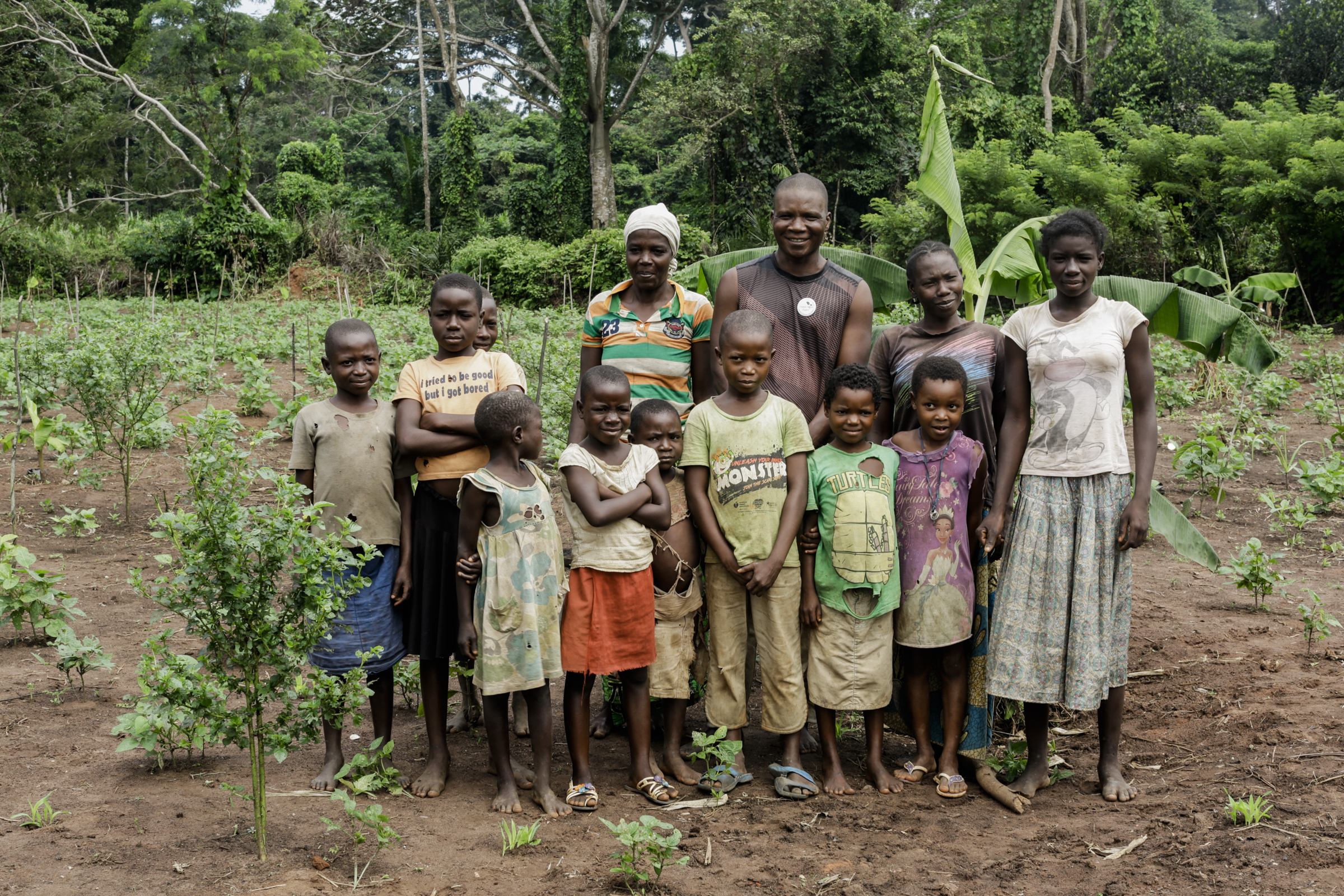
Telewa, father of 12 children, caught typhoid fever. He sought treatment at a local hospital and recovered, but the ordeal wiped out their family savings. The cost: 6,500 Congolese francs, or less than four U.S. dollars.
“I am still struggling,” he says in Lingala, the prevalent language in northwestern DR Congo. “I cannot send my kids to school.”
Fees for government-subsidized education are about $2 per child per month. Five of Telewa’s children are school-aged.
When his coffee plants mature in fall 2020 and he harvests and sells the beans, Telewa has the following plans for the money he will earn: Give one-tenth to God. Send his kids to school. Build a better hut. Buy some animals. Buy a bicycle to better transport seeds and beans.
“I’m so happy to be doing this,” he says. Like many producers, Telewa involves his whole family in the coffee planting, with his kids and grandkids often carrying machetes to the fields to hack at threatening weeds. “When I die, they’ll have something that will take care of them.”
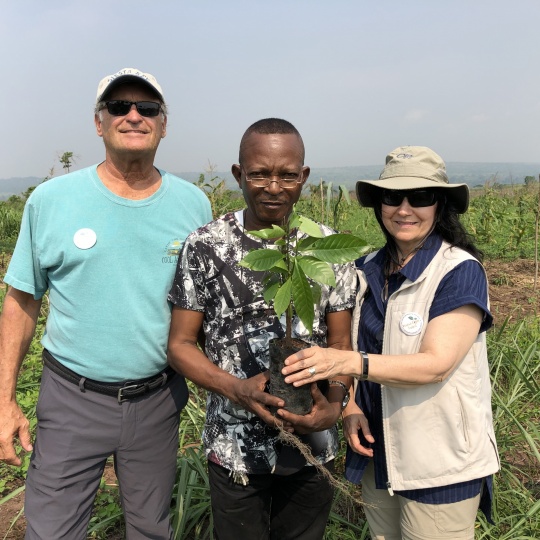
The idea to revitalize coffee in the Karawa region came from Congolese Covenanters, according to Renée Hale, executive director of PCP.
“They had an idea of coffee, which was once a very good supply crop, supporting families and communities,” Hale says. “The fact that coffee was once something good and that it might be everything good again was inspiring. It was always talked about in a dream life.”
Through Covenant connections, Hale met John Schluter, the founder of Café Africa, a nonprofit whose goal is to restore African coffee production to its former levels. Through Schluter, she connected with Kamungele of Café Africa, who also holds a master’s degree in coffee economics and science from the University of Trieste on the northern coast of Italy.
“The most surprising thing to me about being PCP field manager of this particular project,” Hale says, “is how God will show himself, through people and circumstances, out in the middle of the northwest part of the Democratic Republic of the Congo, on any given day.”
Reclaiming Robusta
The Karawa region, with its consistent heat and distinct dry and rainy seasons, gained its reputation as conducive to coffee production soon after Belgium colonized the Congo and through the mid-20th century, after nationalist leader Mobutu Sese Seko seized power in 1965.
And then, three decades later, three factors decimated the industry.
“It happened that the wars came about, and the coffee wilt emerged, and that was after the decline of international prices of coffee,” Kamungele says. “All those factors made it so producers were discouraged to continue with the coffee culture. The whole coffee situation was really in decline, but the potential was there.”
Kamungele and Pascal Luzonzo Dopa, project manager of the Karawa Coffee Project, immersed themselves in a feasibility study for the Karawa region, listening to producers and studying economics. The study determined that reviving coffee production in Karawa for the international market among small producers could catalyze livelihoods.
Toward the end of 2017, Café Africa, PCP, and the CEUM divided the project into three phases: 1) purchase seeds and plant them in seed beds, as well as recruit interested producers through the network of churches within the CEUM; 2) transplant the small plants into individual bags and continue to grow them in nurseries; and 3) transfer those plants into the fields of individual producers.
Last August, whole families weeded their coffee fields, using machetes to ensure accessory growth from intercropped cowpeas and peanuts did not encumber the coffee plants.
The coffee beans grown around Karawa are a species called robusta, which smells a little like chocolate. Unlike arabica beans, which account for the vast majority of the world’s coffee, robusta beans grow well in low altitudes. They’re much bigger plants with much smaller beans, and notably, they also contain one-and-a-half times more caffeine than arabica.
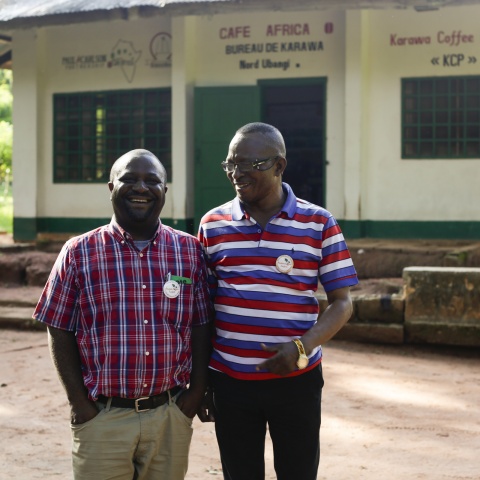
“When we talk about a holistic gospel, we’re talking about connecting everyday life and the needs of the people with their spiritual life as well.”
—Jules Mboka Ngate, president of the Covenant Church of Congo
Jules Mboka Ngate, president of the CEUM, sees the Karawa Coffee Project as a way to intertwine the physical with the spiritual. “People come to church and they believe, and there’s plenty of exposure and room for experiences with God, the spiritual things,” he says, seated outside a community meeting center in Gemena, where the CEUM is headquartered. “What we’re seeing is the need to help and connect this to the physical nature of life. When we talk about a holistic gospel, we’re talking about connecting everyday life and the needs of the people with their spiritual life as well.”
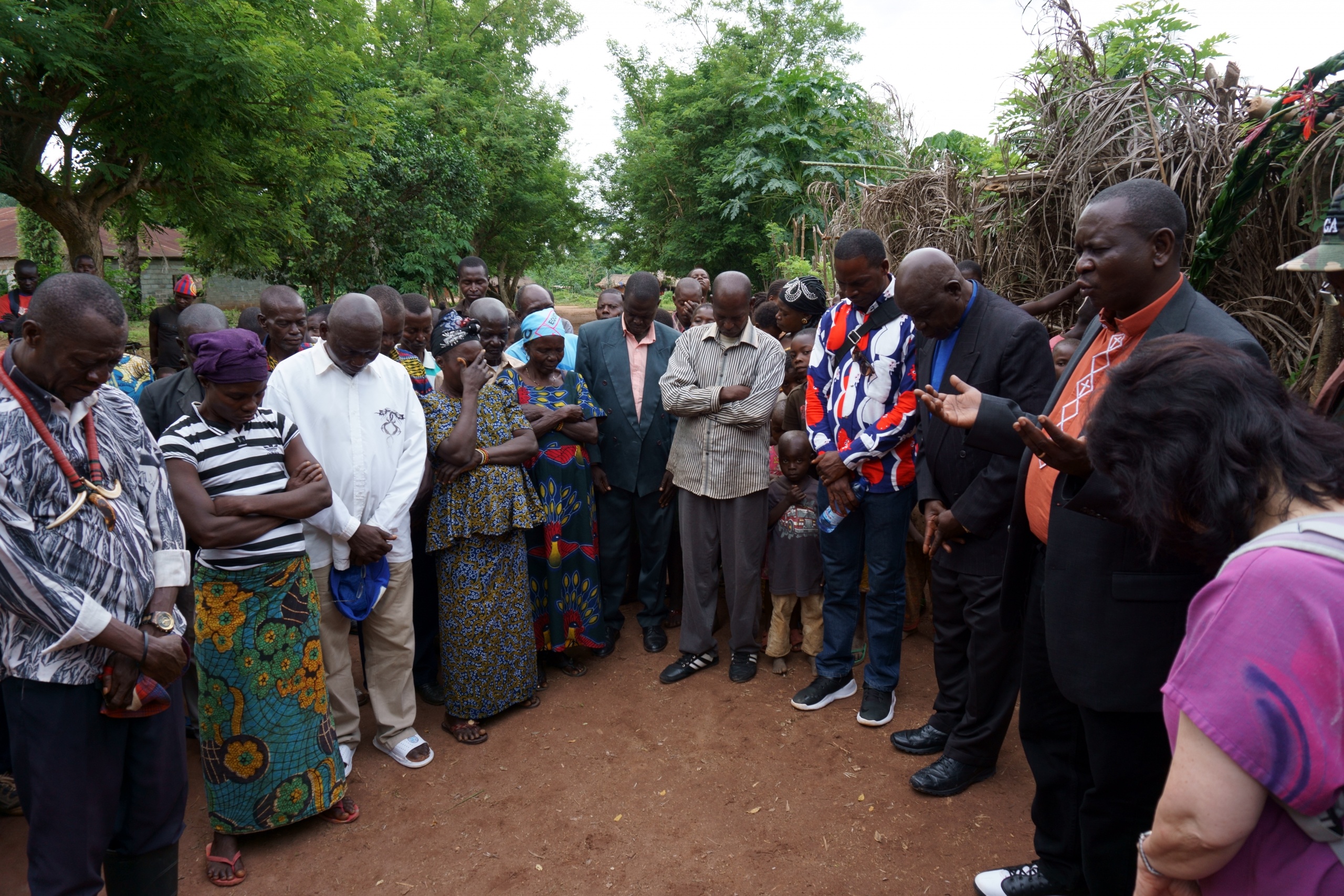
The Congolese arm of Café Africa, which is based in the national capital of Kinshasa but has its largest office and cadre of agronomists in Karawa, provides technical expertise and accountability. Each day, the five agronomists, or coffee-planting experts who work for Café Africa, fan out on motorbikes to visit small producers, checking on the health of the plants and providing coaching.
The CEUM, with more than 1,900 churches throughout DR Congo, has rallied together networks of small producers interested in using their lands to cultivate coffee, including a Covenant church in the village of Bonudana intent on using coffee revenues for such church needs as sheets of metal roofing and new benches.
Paul Carlson Partnership, named after Covenanter Paul Carlson, who was serving as a medical missionary in Congo when he was killed by Simba rebels in 1964, provides comprehensive funds for the entire Karawa Coffee Project. Hale says the goal is for the project to become self-financing within five to seven years.
Kamungele is a self-described “coffee kid” who grew up in a coffee-producing family in Congo’s eastern Kivu region. “I find so much meaning in my life, being involved in this project,” he says. “It is like the pieces of my life, God was somehow putting them together so I can be useful to my country, to my own people. Being involved in the Karawa Coffee Project, I feel I’m being the tool of God for his purposes, and that gives a special feeling of satisfaction and of gratefulness.”
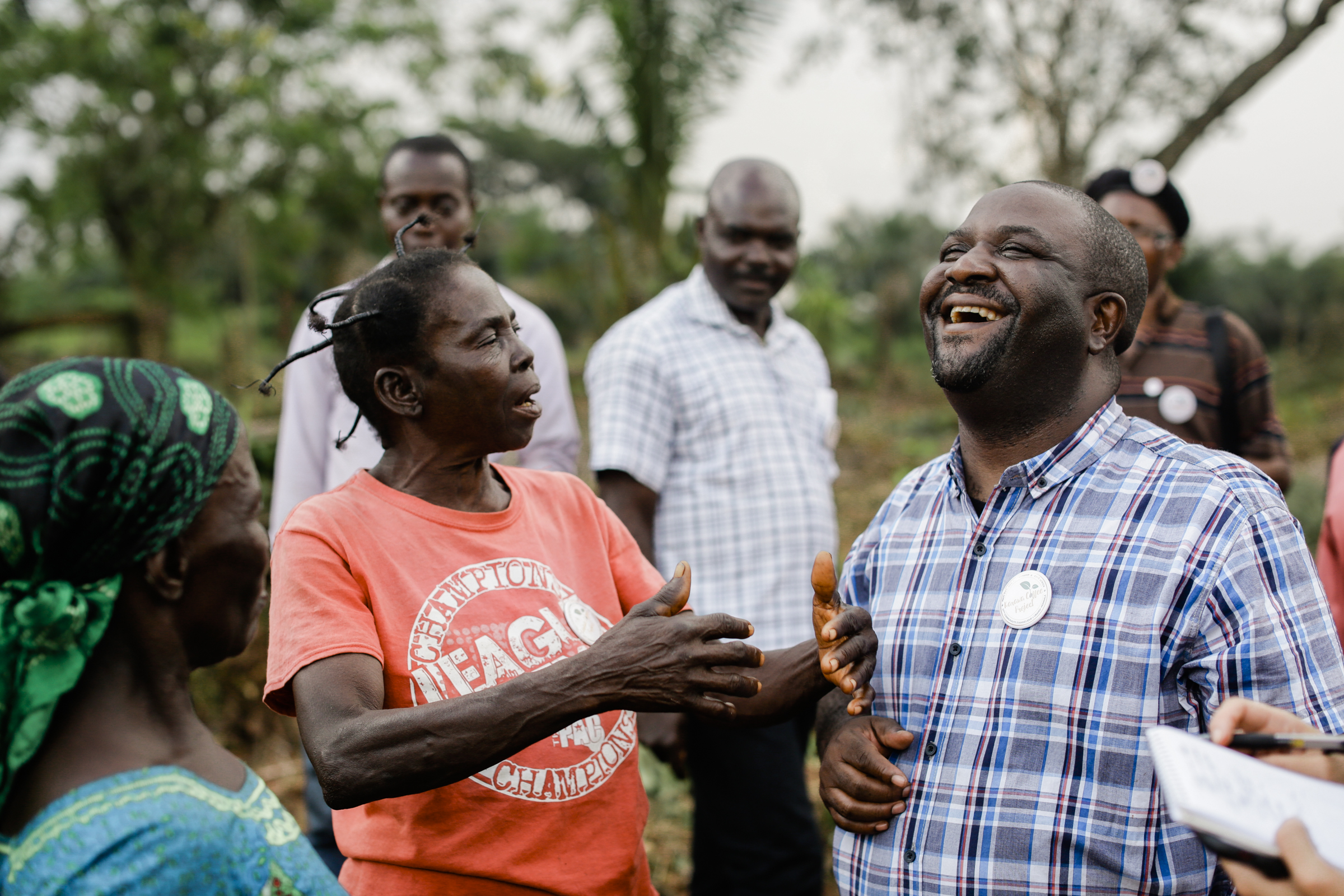
“I find so much meaning in my life, being involved in this project. It is like the pieces of my life, God was somehow putting them together so I can be useful to my country, to my own people.”
—Kambale Kisumba Kamungele, executive director of Café Africa
‘It Supports the Work of God’
The dream of profitable coffee production for small farms is not fantastical one. One has only to look to Gaspy Zongalinga and his wife, Jackie Twasele Kpanemi, who are part of a Covenant church and are respected local entrepreneurs. While several hundred producers have since joined them, they began planting coffee on their own two decades ago.
Kpanemi, who people refer to as “Mama Gaspy,” describes how her parents planted and harvested coffee for a large British manufacturing company that owned coffee plantations in Congo.
This, she says, as she stands in her family’s four hectares of coffee fields, means more because it’s their own farmland.
“Not only does this help my family and help send my kids to school,” she says, “but it supports the work of God.”
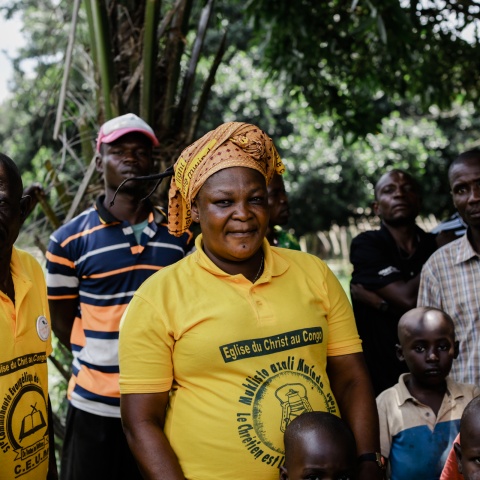
In the late 1990s, her husband had been working as an electrician in a garage when Covenant missionary Ron Ziegelbaur suggested he diversify his work because of looming conflict in the region and recommended he plant palm oil and coffee.
Zongalinga, the firstborn of nine children, describes his memory as a child of how “the coffee planters were the ones with the wealth.” He took Ziegelbaur’s suggestion and soon discovered coffee yielded much more per kilogram than peanuts, the prevailing crop in Karawa. For instance, if he sells 100 kilograms of coffee, he can earn $150; a 100-kilogram sack of peanuts generates half that amount.
“If I have one ton of coffee,” he says in Lingala, which Kamungele translates, “I can sell it for (more than) $1,000. Also, coffee isn’t over-saturated like peanuts are. People come to me for it. I don’t have to go to sell it.”
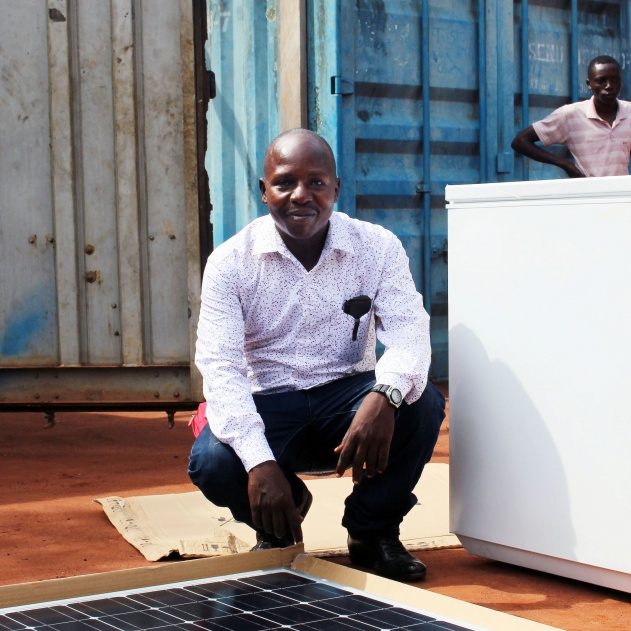
A bit of a vocational guru, Zongalinga also partners with Paul Carlson Partnership in maintaining refrigerators and medical and solar equipment, which has helped him earn money for coffee plants. He has cultivated two hectares (about five acres) of coffee on his own and sells it on the local market.
“Coffee has done a lot for my family and me,” he says. “In periods when I didn’t have any contracts or work, coffee brought income. Because of coffee, I am able to send my children to school—to university. Not only that, if I need money, people can lend me money because coffee is my guarantee.”
The Karawa Coffee Project has invested in Zongalinga and Kpanemi, as they have proven they can grow and harvest coffee. They now have about 8,000 coffee plants, 5,600 of which come from the Karawa Coffee Project.
“We must have a role model, someone people want to aspire to,” Kamungele says, gesturing to Zongalinga as praise music from a practicing choir drifts around him.
For Zongalinga, the Karawa Coffee Project partnership signifies a chance to reach the international market. What’s more, it could change the entire framework of missions in the area.
“In our region, we usually rely on mission support to develop the community,” he says. “My hope is this coffee will bring economic empowerment so that for us, as a local people, we’ll be able to finance local initiatives and support the local church. My dad taught me the importance of tithing one-tenth. Can you imagine if I have 10,000 metric tons of coffee, and I tithe that to the church, how the work of God would be?”
By aggregating planting and harvesting among 1,400 producers, the Karawa Coffee Project can coordinate such complicated logistics as transporting sacks of coffee over Karawa’s shape-shifting roads.
From Conflict to Coffee
About 200 feet from the main road, at a path marked by a trio of round houses made of mud and thatch, coffee plants hover over Kpoda Ngandali’s head, some bearing bulbs of pale green, the color of unripe coffee cherries.
At 54 years old, Ngandali remembers when two civil wars broke out in the Congo in the 1990s, “It was rough. We broke out and just ran into the bush.”
Telewa, the father of 12, also recalls fleeing into the jungle areas when rebels came through Nord-Ubangi, the province where Karawa is located and where the Covenant Church began its work in 1937. Conflict and instability would reign in Congo from civil wars that began in 1996 and continued into the 2000s. In 1997, the ECC evacuated more than 50 missionaries and their families. Although a few missionaries returned for extended periods, a continuous resident missionary presence did not return until 2010. During the wars and their aftermath, soldiers destroyed gardens, killed livestock, and looted homes, schools, and clinics, including the Covenant hospital at Karawa.
After the height of the violence, Telewa says people ventured back to their villages, but many were too sick to plant and farm. Those who did relied on subsistence farming and cultivated peanuts, legumes, and manioc to eat, with little surplus to sell or trade.
But people like Telewa and Ngandali had land. Ngandali remembers how her father once planted coffee. It wasn’t until she heard about the Karawa Coffee Project that she could start resupplying her land with the kinds of coffee plants she once knew in her childhood.
Along with supplying Ngandali with new coffee saplings, agronomists with the Karawa Coffee Project also taught her how to rejuvenate older, fallow plants. The first of the rejuvenated plants were expected to be harvested this past fall, while the new ones would ripen a year later.
Like many other coffee producers, Ngandali intercrops with peanuts, which she harvests every year as she waits for the coffee cherries to mature. Now, as she stands before her 1,050 coffee plants, she considers the financial freedom the coffee will bring.
Ngandali, who has been a widow for eight years, lists her dreams like bullet points: to send her children and grandchildren to school, to cover her family’s medical expenses, and to set aside additional money for emergencies. As she stands alongside her daughter and two-month-old grandson she explains, “I’m happy because this is a guarantee not only for me but for my family, as well.”
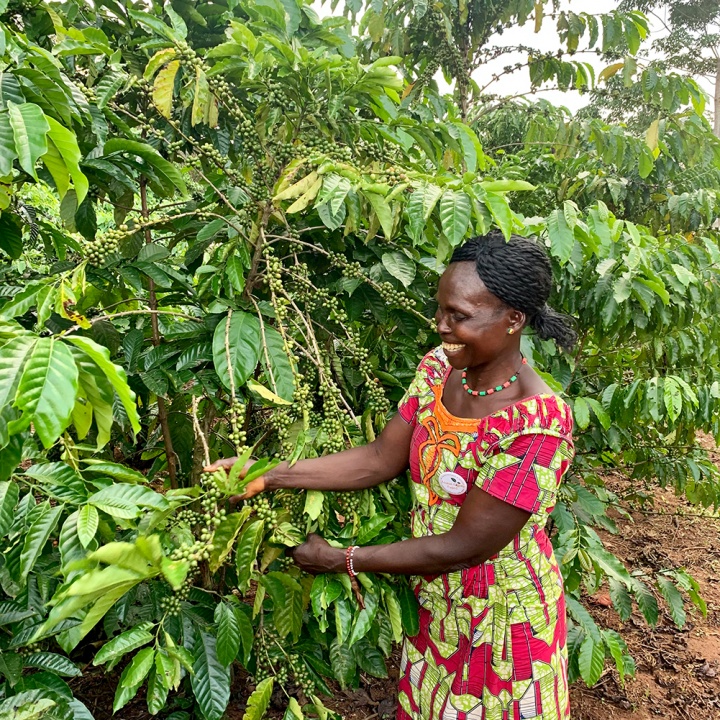
When the sun shines as close to the equator as it does in Karawa, it behaves in unique ways. It often still brightens the sky as the moon begins glimmering through branches of mango and ficus trees. When the sun sets, the sky darkens within 15 minutes.
The third Friday in August, the day begins at 5:21 a.m. with a silver sheen. When the light shows up over their fields, Philippe Kosso and Finga Kosso Bibi emerge from their garden hut with their nephew and three of their four children.
“Mbote!” they shout in greeting.
A layer of mist has risen over a dip beyond their land, stretching to the heart of Karawa and its assemblage of homes. Here though, miles away, Mama and Papa Koso tend fields of growing saplings. They stroll over their soil, their hands devoid, for now, of tools. They smile at passersby in the dawn, their feet making imprints on land filled with newly planted coffee.
We invite you to partner with our brothers and sisters in the Covenant Church in DR Congo to revitalize coffee production there.
For information and how to give, visit PaulCarlson.org/coffee.
